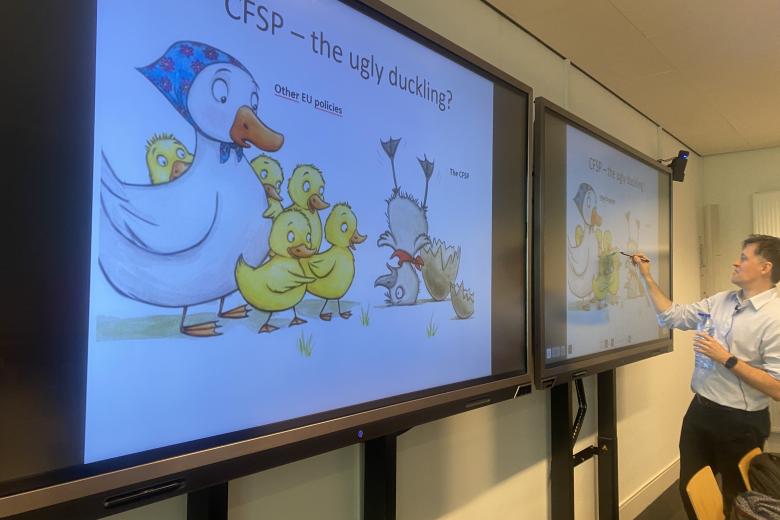“The EU is not short of rules. It’s whether they are enforced or not.”
Emily O’Reilly has held the position of EU Ombudsman for over a decade, ensuring the transparency of the EU institutions by investigating high-profile cases of maladministration and promoting good governance. On June 20, 2024, she gave a keynote address at the conference “Between narratives and reality: The EU at the gates of a new mandate,” organized by The Faculty of Law and Studio Europa Maastricht of Maastricht University. The ombudsman touched on the most concerning topics in the context of the recent EU Parliament elections, exploring what the outcomes of these votes indicate and how the battle of pro-EU and anti-EU visions will impact the future of the alliance. In her interview with Studio Europa Mrs. O’Reilly explained why she still believes in the legacy of the Maastricht Treaty, and how she views the main task of her office.
From Brexit to Qatargate
A former journalist, O’Reilly was elected as European Ombudsman after becoming Ireland’s first female Ombudsman and Information Commissioner, as well as Commissioner for Environmental Information. In her conversation with Studio Europa, she reflected on the challenges that the EU institutions have faced since she took office in 2013: from the migration crisis and Brexit to COVID-19 and the Russian invasion of Ukraine.
As these challenges mount, the ombudsman believes that her main task is to make sure that the EU institutions’ concerns about geopolitical issues do not allow them to lose sight of key values such as accountability, transparency, and fundamental rights: “There has been almost a fever-like atmosphere in recent weeks with the EU Parliament elections. We are looking to the US, at Trump, we are looking at what’s happening in Russia and Ukraine, we are looking at China. So how the EU administration reacts in relation to that is obviously important for all of us, but how they are held accountable and embrace transparency is important for my office.”
It appears, however, that issues like ethics and the rule of law were not the focus of the latest European elections, despite extensive media coverage of Qatargate and other corruption scandals involving senior EU officials: “When Qatargate happened, that was an international story, partly because it was a very easy-to-understand story. It was cartoon-like corruption. If you imagine children drawing corruption, they would be drawing suitcases of money. But then the story moved on and nothing really happened in relation to court cases that might have risen out of it,” the ombudsman points out.
“The Parliament made some changes in relation to its rules, but the story died to a degree. People would ask me during the last year and a half, ‘Do you think this is going to play a role in the European elections?’ and I thought probably not because it no longer seemed to be an issue for media even within the EU. It depended on the member state. For example, in some countries like Denmark, with a high level of trust in their government and institutional barriers against corruption, it would’ve played in a particular way but in other countries, it wasn’t such a big deal. And if I go from the experience of my own country, Ireland, it wasn’t mentioned at all,” she continues.
it was a very easy-to-understand story. It was cartoon-like corruption.
Ethics vs. Existential Concerns
Asked whether it indicates that the priorities of Europeans are shifting, the ombudsman admits that people are more concerned with everyday problems: “The issues that did come into play are the cost of living crisis, which still affects so many people across Europe, and just the sense of general anxiety following COVID, the fuel crisis, and the subsequent rise in living costs. I also think, as you saw with the rise in support for right-wing parties, the migration button was pressed. Although there was not just one election, there were 27 separate elections and in every country there are differences, I think migration did play a role in every country’s election.”
Despite other issues taking centre-stage, earlier in April, the EU Parliament approved the creation of a new EU body for ethical standards. The future of this institution will largely depend on whether these standards will actually be enforced and not just declared, says the ombudsman: “It started off at a high level with various promises and commitments to do everything from forbidding MEPs from having second jobs to all sorts of transparency measures, but by the time it got through a divided parliament, a lot of those things were off the table. The test will be if outgoing MEPs take on new jobs, if they get involved in lobbying and so on. New transparency rules have been brought in for them and there are also new rules for the incoming MEPs, but are they going to be enforced? The EU and the EU Parliament are not short of rules, it’s whether they are enforced or not.”
The good guys can become bad as well.
Keeping Bad Guys Accountable
As O’Reilly likes to say, her job is to “keep the good guys good.” Asked whether it might currently be more important to keep the bad guys from being bad, the ombudsman quotes former Irish Prime Minister Garret FitzGerald, who said that politics was the most ethically challenging of all professions: “The good guys can become bad as well. Jean-Claude Juncker, who was the former Commission president before President von der Leyen, said ‘We all know what the right thing to do is, the question is whether we’ll still get elected if we do it.’ And that is human nature. I talked a lot about migration and deaths in the Mediterranean. Is there anybody in the European Parliament who wants this to happen? No, absolutely not. So why does it still happen? Because the good guys are afraid that if they do certain things in relation to making sure that people at least don’t drown in the Mediterranean, they might lose support. I was asked by a journalist when we did our investigation into the sinking of the Adriana when 600 people drowned ‘Maybe if people knew they are going to be saved it would be an inducement for them to come?’ So the alternative is to have them drown?” the ombudsman wonders.
While acknowledging the significant political challenges that migration poses, O’Reilly emphasizes that it’s not a problem that can be easily solved because it’s as old as humanity: “People move, it’s our history. In my own country, millions of us moved in the wake of famine in the 1800s. People also often imagine that Jewish people were welcomed in other countries after World War II. They were not. And nor were they welcomed when they tried to escape before Hitler did what he did. Nobody is ever going to get it right with the challenges that migration poses and humanitarian issues that arise. But could we just cling to the notion that we really don’t want people to die and that we should do our best to make sure that that doesn’t happen? What happened with the Adriana in full plain sight of the European Union was horrific and should have never been allowed to happen.”
Text continues below the photo.
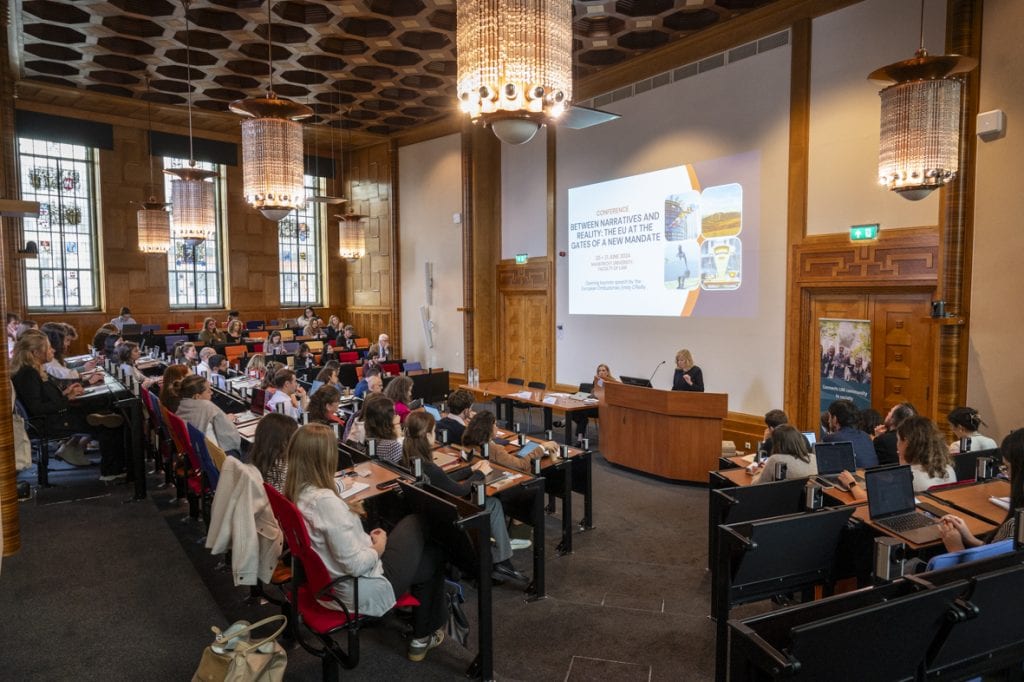
Fairytale Turned Nightmare
As the EU elections showed a significant increase in young voters supporting far-right parties, especially in France and Germany, the ombudsman says it’s all about the narrative: “Why do people move to the right? Because sometimes the right, in particular the far-right, makes fairytale promises. Or they point to an enemy, and history has shown that there is always an enemy to be found somewhere.”
The ombudsman reminds that the outcomes of using this rhetoric can turn out to be far from a fairytale: “Look at Brexit, look at the promises that were made and the desperately negative outcomes that there have been for so many people. And where is accountability in that?”
Now the younger generation of Britons is paying the price: “One of the groups of people who were most affected by that were young people, in terms of their opportunities even to wander freely around Europe or go to college in Europe. We also see the devastation that was wreaked on small businesses. But people voted for it.” The day after the elections, the most googled question in Great Britain was “What is the EU?”, noted the ombudsman.
People don’t wake up in the morning wondering about what the future of the EU is going to be.
Happy Being European
Still, Eurosceptics point out the decline in institutional trust in the EU. The ombudsman believes there are ways to restore it: “People don’t wake up in the morning wondering about what the future of the EU is going to be. Most people don’t really understand the EU or how it works. Most people are concerned with their own daily concerns – with their families, with their health, with their education, with their jobs. The EU does many wonderful things and people don’t realize. Going back to Brexit, only when they no longer got the funds from the EU did they realize in towns and villages all over the UK ‘Oh, that was the EU.’ If the EU could focus much more on the daily existential concerns of people, then it would gain more trust.”
Another important issue, according to the ombudsman, is whether people representing the EU at the highest level can live up to the standards they were appointed to protect: “I believe that they have to behave more honestly and really be exemplars in relation to how they conduct themselves politically and institutionally. We have dealt with a lot of ethical issues recently. For example, when former EU Commission President (José Manuel) Barroso, still in the middle of the financial crisis, went to work for Goldman Sachs. In another case, the executive director of the European Banking Authority, the authority that was set up precisely to reestablish citizens’ trust in financial regulation, went unimpeded to the biggest banking lobby association in Europe.”
Text continues below the photo.
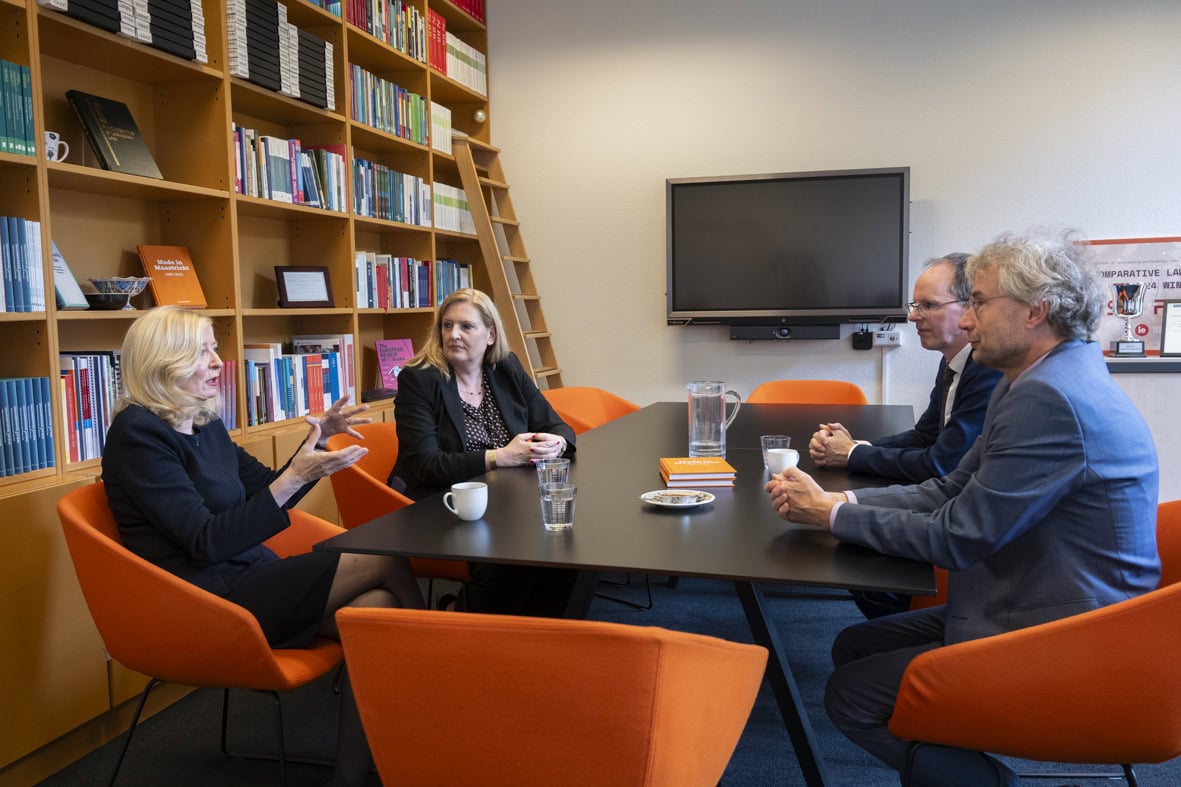
These stories, picked up by Eurosceptic press, allow the far-right movement to paint the picture of EU administration just looking out for itself, which isn’t fair, says the ombudsman: “That is why when I make recommendations in those cases and when I talk more generally about this issue, I tell the Commission and others that they need to join the dots between these small acts and an atmosphere that allows the far-right to dictate the narrative in a negative way.”
Despite all the challenges and shortcomings facing the EU, O’Reilly sees the value of the Maastricht Treaty, which established her office, in the idea of European citizenship: “It set us all thinking: what does a larger European community mean? Most people are happy with the notion of European citizenship because it obviously gives us a lot.”
The conference “Between narratives and reality: The EU at the gates of a new mandate” was supported by the Maastricht Centre for European Law and Universiteitsfonds Limburg/SWOL.
Special thanks to the organizing team: Leticia Diez Sánchez and Fulvia Ristuccia.
Also read
-
DigiMach places Meuse-Rhine Euroregion at the heart of industrial digitalisation
DigiMach (Digital Machining) is a new cross-border project uniting Belgium, Germany, and the Netherlands around a common goal: accelerating the digitalisation of the machining industry in the Meuse-Rhine Euroregion.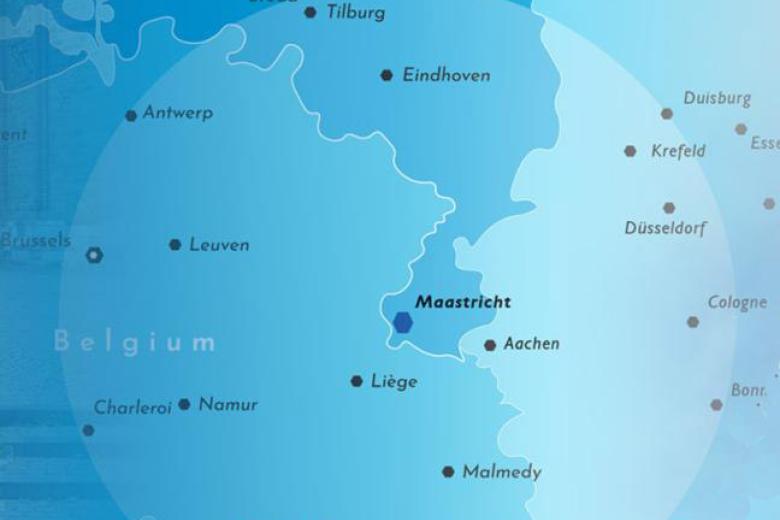
-
Globalisation & Law Network seminar with Áine Ryall
On 24 November 2025, the Globalisation & Law Network, together with the Institute for Globalisation and International Regulation (IGIR) held the seminar with Professor Áine Ryall.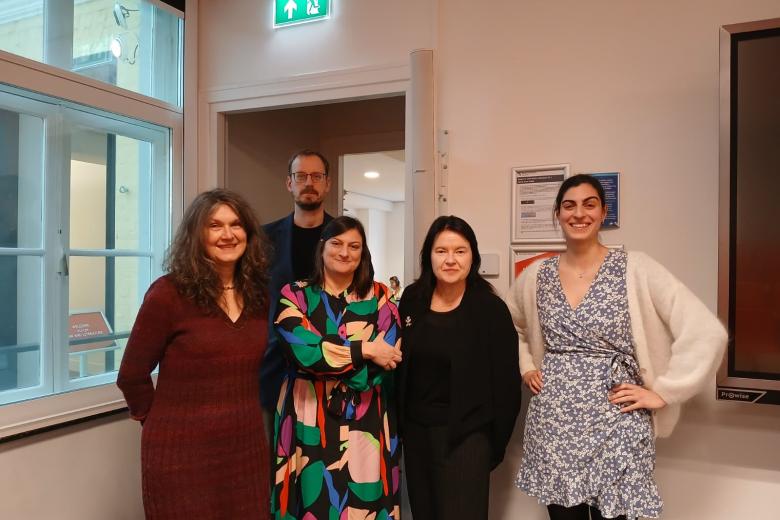
-
Guest Lecture: Lóránt Havas explores current challenges in the EU’s CFSP
Lóránt Havas delivered a guest lecture on the EU’s evolving CFSP, discussing key legal developments, institutional challenges, and new defence instruments.